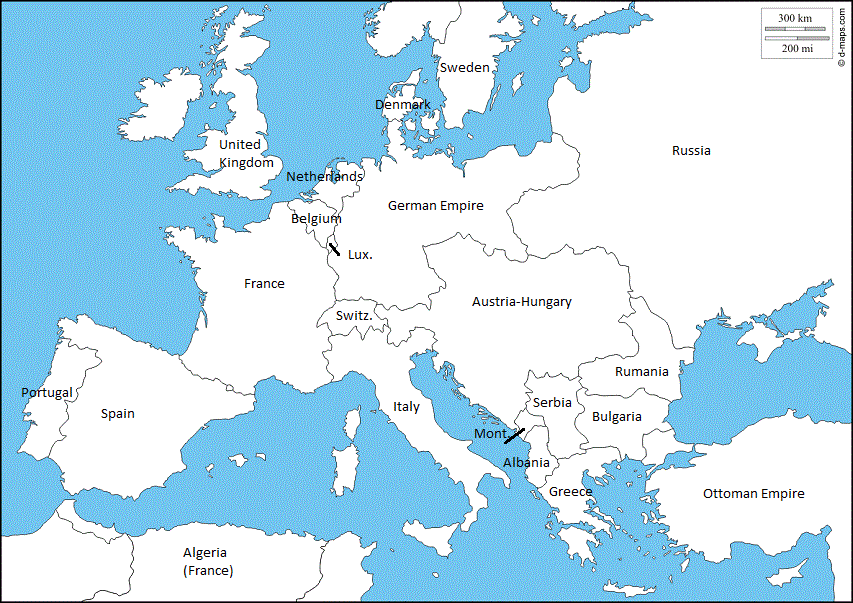Over the last couple of days, I’ve posted some entries on the deep origins of the First World War (part one, part two). We’re just now getting to the point where the plots start twisting around one another like amorous snakes … this gets somewhat confusing from this point onwards (assuming you’re not already confused, that is).
Bismarck provides a masterclass in realpolitik
Otto von Bismarck looms large in the story of the origins of the First World War, although he died several years before it broke out: he was the pre-eminent architect of the German Reich, and a brilliant (and ruthless) diplomatic engineer. Despite a common belief that Bismarck as a warmonger, Eric Hobsbawm wrote that Bismarck “remained undisputed world champion at the game of multilateral diplomatic chess for almost twenty years after 1871, devot[ing] himself exclusively, and successfully, to maintaining peace between the powers” (The Age of Empire: 1875–1914).
While Bismarck became Chancellor of the new Reich in 1871, he had already held a series of important and powerful posts in the Prussian government, including Minister President of Prussia and Foreign Minister from 1861. In 1862, he made his long-range intentions quite plain in a speech to the Budget Committee:
Prussia must concentrate and maintain its power for the favorable moment which has already slipped by several times. Prussia’s boundaries according to the Vienna treaties are not favorable to a healthy state life. The great questions of the time will not be resolved by speeches and majority decisions — that was the great mistake of 1848 and 1849 — but by iron and blood.
In his long and impressive political career, he guided the creation of the unified German state while fending off the political demands of the liberals and socialists by conceding just enough to socialist pet causes to keep them working within the system (state pensions, for example, were a Bismarckian innovation calculated to just barely satisfy the left, but not to cost the state much if any actual revenue due to the high retirement age it set). He was emphatically not a fan of democracy: at one point, he finagled a “legal” way for the Prussian government’s revenues to continue for four years without a hint of democratic interference from the squabbling politicians in the Reichstag.
The editors of Bismarck’s Wikipedia entry seem to think he was first and foremost a benefactor to the working class, but I think they’re projecting — Reichskanzler Prince Otto von Bismarck was never particularly concerned with the welfare of the poor, except where that welfare contributed to the construction of a greater German empire. If that meant pandering to the Socialists, he’d pander with the best of them:
Bismarck implemented the world’s first welfare state in the 1880s. He worked closely with large industry and aimed to stimulate German economic growth by giving workers greater security. A secondary concern was trumping the Socialists, who had no welfare proposals of their own and opposed Bismarck’s. Bismarck especially listened to Hermann Wagener and Theodor Lohmann, advisers who persuaded him to give workers a corporate status in the legal and political structures of the new German state.
The wars he did fight were each calculated to advance the cause of German unification … under Prussian guidance and control, of course. Denmark lost the provinces of Schleswig (to Prussia) and Holstein (to Austria) in 1864, then Austria in turn lost Holstein (to Prussia) and Lombardy-Venetia (to Italy) two years later. His public moment of triumph was the proclamation of Wilhelm I as Emperor of Germany:
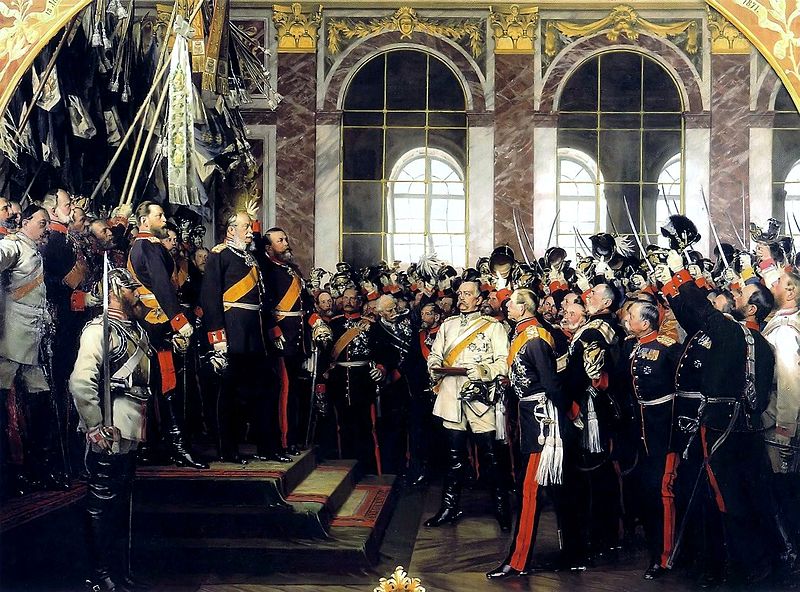
The proclamation of Prussian King Wilhelm I as German Emperor in the Hall of Mirrors in Versailles (Bismarck is at centre-right in the white uniform), by Anton von Werner. This version was commissioned by the Prussian royal family for chancellor Bismarck’s 70th birthday. (via Wikipedia)
Bismarck was not a fan of colonial adventures — he believed they were a distraction from more important issues in Europe and that the cost to obtain and run them was greater than the benefits derived from having them. Despite that, he allowed some colonies to be accumulated as game pieces to further his own priorities domestically. One of the European policies Bismarck implemented to great effect was the diplomatic isolation of France — on the quite reasonable basis that the French would take revenge on Germany for the humiliation of 1870 if they felt powerful enough to try it. The French Third Republic, which succeeded the Second Empire, was left without allies (and more galling: without the provinces of Alsace and Lorraine), due to Bismarck’s diligent efforts to bind the other great powers in alliances with one another and Bismarck managed to keep the French in that vulnerable position for the rest of his time in office.
Bismarck’s attempted solution to the Austro-Russian tensions in the Balkans was the Dreikaiserbund (The League of the Three Emperors) in 1873. This “meeting of the minds” was intended to dampen the risk of conflict by giving the Austrians a free hand in the Western area of the Balkans and the Russians a free hand in the East. The plan didn’t work as well as Bismarck had hoped, and the league was dissolved in 1887, as both of the other signatories felt too hampered by the terms of the agreement for too little benefit in return.
Bismarck’s next move was to create the Dual Alliance between Germany and Austria. The alliance was ostensibly defensive in nature, calling for each party to aid the other in the case of an attack by a third country (if the attacker was Russia, the alliance called for both parties to declare war, if it was another country — France — the non-attacked party was to remain neutral). In 1882, the Italians were added to the arrangement, but the terms of the Triple Alliance were not as defensive: requiring the other parties to actively assist an allied nation that was attacked, not just to remain neutral. Italy negotiated one clause in the agreement to ensure that they didn’t have to fight against Britain (which they activated in 1914).
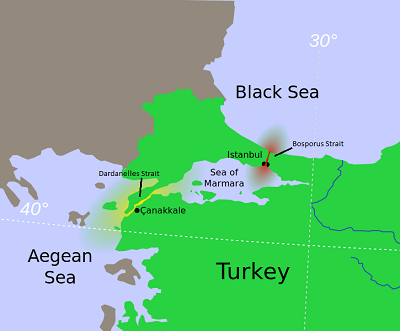
The Turkish Straits (Bosporus Strait highlighted in red, and the Dardanelles Strait in yellow) (via Wikipedia)
One of Bismarck’s last diplomatic initiatives was to negotiate the secret
Reinsurance Treaty with Russia in 1887, fully in line with the continued emphasis of ensuring that Russia would not ally with France. The terms obligated the two nations to remain neutral in any conflict if the other party was attacked (except if Russia attacked Austria or if Germany attacked France). It also guaranteed German neutrality if Russia took action against the Ottomans, specifically in the Bosporus and the Dardanelles Straits — the two waterways connecting the Sea of Marmara with the Black Sea and the Aegean Sea. It’s clear why the Russians were interested … this was one of their generations-long geopolitical goals, but from the German point of view it ran the risk of provoking a struggle with Britain should it come to light (the treaty did come to public attention in 1896, as the
Hamburger Nachrichten published the secret-but-now-expired details, triggering some degree of public alarm (and probably some tightened sphincters in London)).
In a speech to the Reichstag in 1888, Bismarck predicted the bloody outcome if a localized Balkan War were to trigger a continental one (from Emil Ludwig’s 1927 work, Wilhelm Hohenzollern: The last of the Kaisers):
He warned of the imminent possibility that Germany will have to fight on two fronts; he spoke of the desire for peace; then he set forth the Balkan case for war and demonstrates its futility: “Bulgaria, that little country between the Danube and the Balkans, is far from being an object of adequate importance … for which to plunge Europe from Moscow to the Pyrenees, and from the North Sea to Palermo, into a war whose issue no man can foresee. At the end of the conflict we should scarcely know why we had fought.”
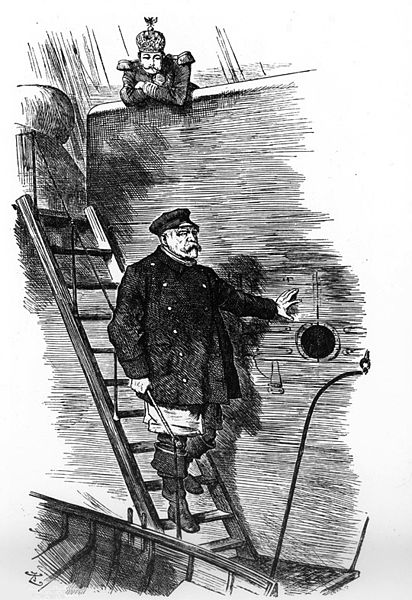
Dropping the Pilot, a caricature by Sir John Tenniel (1820-1914), first published in the British magazine Punch, March 1890. (via Wikipedia)
It is perhaps fortunate for our current world that Bismarck and Wilhelm II could not co-exist, and Wilhelm “dropped the pilot” in 1890. Even in his later years, Bismarck was the best at the diplomatic trade: certainly better than any of the men who followed him. In Bismarck’s absence, the balance of power he had so carefully maintained disintegrated bit by bit.
One of the first critical pieces of diplomatic plumbing to go was the Reinsurance Treaty with Russia: the Russian government asked to renew the agreement, but Chancellor Caprivi (Bismarck’s successor) and Kaiser Wilhelm II thought they could do better by working the personal relationship between Wilhelm and Tsar Alexander III (and later, his “dear cousin Nicky” — Tsar Nicholas II). This worked so well that the French and Russian governments were already extending tentative diplomatic feelers toward one another by 1891.
Willliam L. Langer wrote of the end of Bismarck’s career:
Whatever else may be said of the intricate alliance system evolved by the German Chancellor, it must be admitted that it worked and that it tided Europe over a period of several critical years without a rupture. … there was, as Bismarck himself said, a premium upon the maintenance of peace.
[…]
His had been a great career, beginning with three wars in eight years and ending with a period of 20 years during which he worked for the peace of Europe, despite countless opportunities to embark on further enterprises with more than even chance of success. … No other statesman of his standing had ever before shown the same great moderation and sound political sense of the possible and desirable. … Bismarck at least deserves full credit for having steered European politics through this dangerous transitional period without serious conflict between the great powers.”
The third post in the series and we still haven’t left the nineteenth century! More to follow in the next few days.





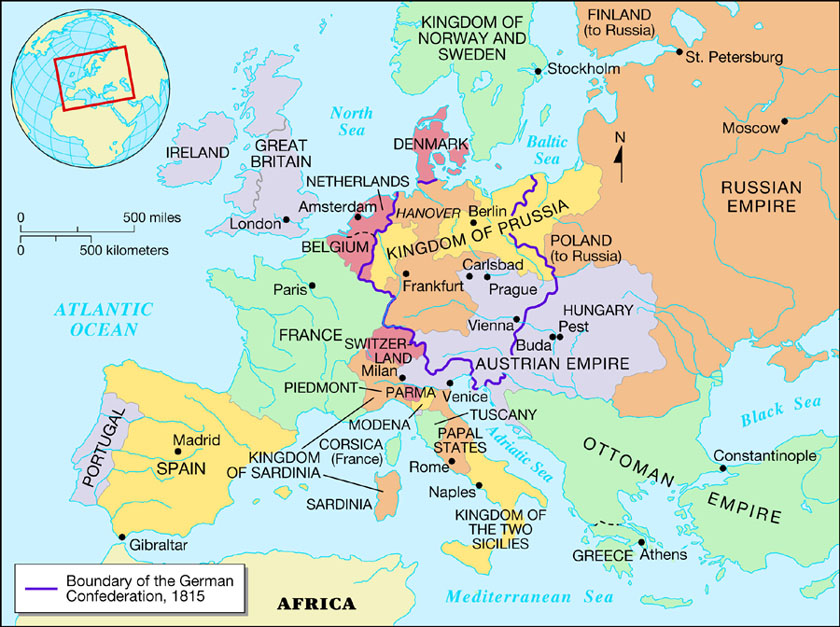
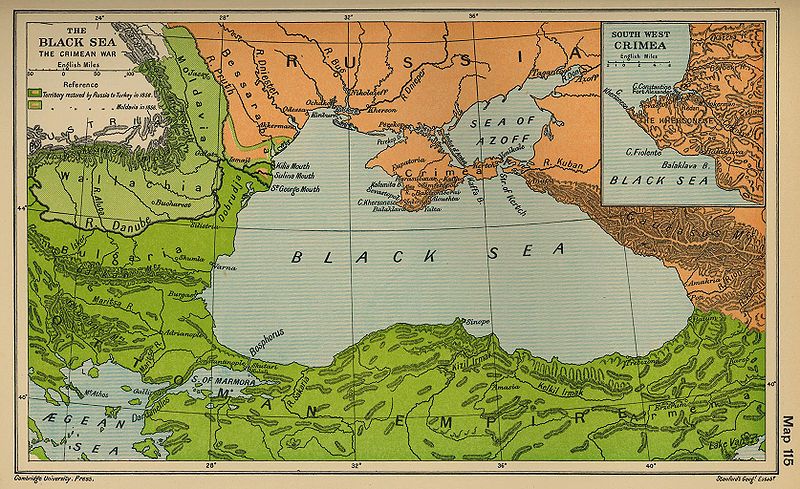
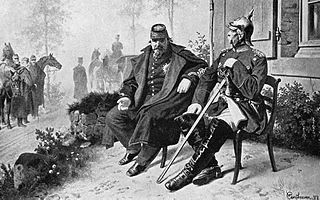
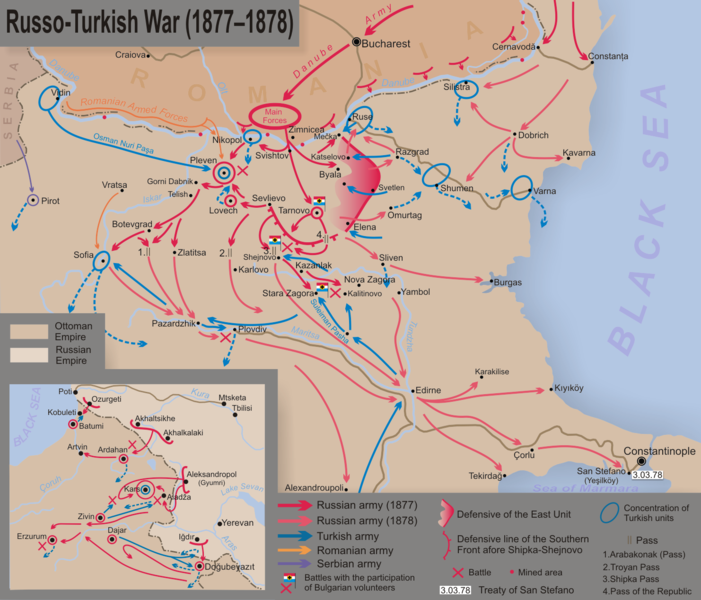
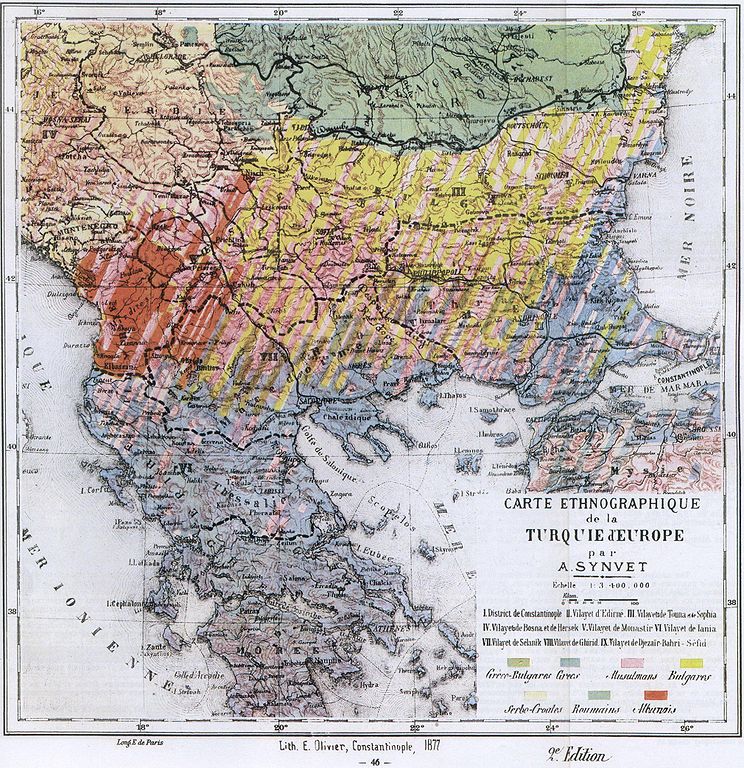
 Yet, at the same time, the trans-rights movement is growing in power and cachet: a recent Time cover featuring the actress Laverne Cox was headlined “THE TRANSGENDER TIPPING POINT.” The very word “transgender,” which first came into wide use in the nineteen-nineties, encompasses far more people than the term “transsexual” did. It includes not just the small number of people who seek gender-reassignment surgery—according to frequently cited estimates, about one in thirty thousand men and one in a hundred thousand women—but also those who take hormones, or who simply identify with the opposite gender, or, in some cases, with both or with neither. (According to the National Center survey, most trans women have taken female hormones, but only about a quarter of them have had genital surgery.) The elasticity of the term “transgender” has forced a rethinking of what sex and gender mean; at least in progressive circles, what’s determinative isn’t people’s chromosomes or their genitals or the way that they were brought up but how they see themselves.
Yet, at the same time, the trans-rights movement is growing in power and cachet: a recent Time cover featuring the actress Laverne Cox was headlined “THE TRANSGENDER TIPPING POINT.” The very word “transgender,” which first came into wide use in the nineteen-nineties, encompasses far more people than the term “transsexual” did. It includes not just the small number of people who seek gender-reassignment surgery—according to frequently cited estimates, about one in thirty thousand men and one in a hundred thousand women—but also those who take hormones, or who simply identify with the opposite gender, or, in some cases, with both or with neither. (According to the National Center survey, most trans women have taken female hormones, but only about a quarter of them have had genital surgery.) The elasticity of the term “transgender” has forced a rethinking of what sex and gender mean; at least in progressive circles, what’s determinative isn’t people’s chromosomes or their genitals or the way that they were brought up but how they see themselves.
